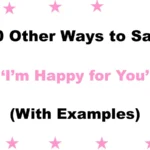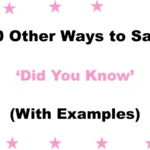Finding the right words to express appreciation—especially in difficult or sensitive situations—can make your message feel genuine, empathetic, and professionally composed. Instead of repeating the same phrase like “Thank you for your understanding,” having a variety of alternatives lets you connect better with your audience while maintaining warmth and respect.
Whether you’re handling delays, changes, or misunderstandings, these thoughtful options can help build trust, clarity, and a positive tone in any business conversation.
What Does “Thank You for Your Understanding” Mean?
“Thank you for your understanding” is a polite expression used to acknowledge someone’s patience, flexibility, or empathy in a situation that may not be ideal. It’s often used when explaining delays, mistakes, changes, or asking for someone’s tolerance. The phrase conveys appreciation and helps keep communication respectful and professional, especially when you’re asking for grace or extra time.
When to Use “Thank You for Your Understanding”
- When there’s a delay in delivery, response, or timeline
- When you’re explaining a mistake or technical issue
- When asking for flexibility, rescheduling, or extended deadlines
- When navigating conflict or offering clarification on a tough situation
Is It Professional or Polite to Say “Thank You for Your Understanding”?
Absolutely. “Thank you for your understanding” is a widely accepted professional phrase. It reflects both gratitude and emotional intelligence, especially in corporate or service-based settings. It’s appropriate for clients, colleagues, vendors, and even leadership. However, it can feel overused or too formal in casual messages, which is why having alternatives is important.
Pros and Cons of Saying “Thank You for Your Understanding”
Pros:
- Polite and respectful tone
- Shows empathy and appreciation
- Widely recognized in professional communication
Cons:
- Can feel overused or generic if repeated too often
- May sound passive or distant in emotionally charged scenarios
- Some may perceive it as a soft apology without responsibility
Synonyms for “Thank You for Your Understanding”
- I appreciate your patience
- Thank you for bearing with us
- Your flexibility means a lot
- Thanks for staying with us
- I value your cooperation
- I’m grateful for your support
- Thank you for giving us time
- Your understanding is appreciated
- Thank you for your continued trust
- We appreciate your cooperation
- Many thanks for your patience
- Thank you for waiting
- Thanks for your grace
- We’re grateful for your flexibility
- Appreciate your willingness to adjust
- Thank you for adapting with us
- I’m thankful for your responsiveness
- Your support helps us move forward
- I value your understanding
- Thanks for being so considerate
- Thank you for staying patient
- Thanks for working through this with us
- We’re thankful for your collaboration
- Your calm is appreciated
- Thanks for trusting us through the process
- I appreciate your time and consideration
- Thank you for being understanding
- Much appreciated for your patience
- Your kindness doesn’t go unnoticed
- We’re thankful for your continued patience
1. I Appreciate Your Patience
Definition: Expresses gratitude for someone’s willingness to wait without frustration.
Detailed Explanation: This phrase works well when you’re dealing with delays or issues that require someone to wait or hold off. It emphasizes respect for their time.
Scenario Example: Thank you for waiting while our team resolved the technical issue—I appreciate your patience.
Best Use: During service or delivery delays.
Worst Use: When the issue is caused by negligence.
Tone: Warm, humble, and professional.
2. Thank You for Bearing with Us
Definition: A polite way to acknowledge inconvenience caused and appreciate tolerance.
Detailed Explanation: Suitable when a process is taking longer than expected, or if the client is facing temporary difficulties.
Scenario Example: We’re working on the fix now—thank you for bearing with us.
Best Use: During ongoing issues or system outages.
Worst Use: In highly formal executive communications.
Tone: Friendly, sincere, and casual-professional.
3. Your Flexibility Means a Lot
Definition: Thanks someone for being adaptable to changes.
Detailed Explanation: Use this phrase when a person has adjusted plans or accepted modifications without resistance.
Scenario Example: I know the schedule shifted unexpectedly—your flexibility means a lot.
Best Use: When deadlines or datelines change.
Worst Use: In legal or highly formal communications.
Tone: Appreciative, conversational, and respectful.
4. Thanks for Staying with Us
Definition: Acknowledges loyalty or patience through an issue.
Detailed Explanation: Use when someone has stayed committed or loyal through delays or challenges.
Scenario Example: Despite the update delay, we appreciate you—thanks for staying with us.
Best Use: During client service or product problems.
Worst Use: When the issue hasn’t been explained properly.
Tone: Warm, reassuring, and humble.
5. I Value Your Cooperation
Definition: Shows respect for the collaborative effort.
Detailed Explanation: Ideal when working as a team or asking for someone’s agreement in moving forward.
Scenario Example: We’ll need to adjust our approach—I value your cooperation.
Best Use: Team-based environments or partner projects.
Worst Use: When you need to apologize directly.
Tone: Professional, mutual, and respectful.
6. I’m Grateful for Your Support
Definition: A more heartfelt way to say thank you.
Detailed Explanation: Use this when the other party has backed you during a tough or uncertain time.
Scenario Example: As we adapt to the new process, I’m grateful for your support.
Best Use: During transitions or system rollouts.
Worst Use: For small, impersonal issues.
Tone: Heartfelt, sincere, and positive.
7. Thank You for Giving Us Time
Definition: Shows appreciation for someone allowing space or time to solve something.
Detailed Explanation: Ideal for deadline extensions or postponed meetings.
Scenario Example: We’re actively investigating the issue—thank you for giving us time.
Best Use: Project delays or issue resolutions.
Worst Use: When no timeline was previously agreed upon.
Tone: Grateful, clear, and polite.
8. Your Understanding Is Appreciated
Definition: Expresses polite gratitude without overexplaining.
Detailed Explanation: Great when you want to acknowledge the other party’s tolerance but remain professional.
Scenario Example: We’re working on final approvals—your understanding is appreciated.
Best Use: Status updates and polite notices.
Worst Use: Overused in automated emails.
Tone: Professional, formal, and respectful.
9. Thank You for Your Continued Trust
Definition: Acknowledges ongoing support despite potential challenges.
Detailed Explanation: Use this to maintain client relationships during bumpy periods.
Scenario Example: Thank you for your continued trust as we complete this rollout.
Best Use: Long-term clients or loyal partnerships.
Worst Use: For new contacts or first-time issues.
Tone: Appreciative, trust-building, and loyal.
10. We Appreciate Your Cooperation
Definition: A neutral and respectful way to say thanks.
Detailed Explanation: Best used when coordinating with multiple parties or departments.
Scenario Example: We appreciate your cooperation in adjusting to the new login system.
Best Use: Cross-team communication and client updates.
Worst Use: One-on-one apologies.
Tone: Neutral, professional, and structured.
11. Many Thanks for Your Patience
Definition: An enhanced version of a simple thank you.
Detailed Explanation: Emphasizes gratitude while sounding a bit more formal than “thanks.”
Scenario Example: Many thanks for your patience during the onboarding phase.
Best Use: Client onboarding, team delays.
Worst Use: Casual Slack messages.
Tone: Polished, grateful, and warm.
12. Thank You for Waiting
Definition: A straightforward thanks for someone’s time.
Detailed Explanation: Perfect for meetings, calls, or situations where a person had to wait.
Scenario Example: Thank you for waiting—let’s begin the presentation.
Best Use: Meetings and live sessions.
Worst Use: Complex, ongoing issues.
Tone: Direct, polite, and simple.
13. Thanks for Your Grace
Definition: A softer, more emotional form of thanks.
Detailed Explanation: Shows appreciation for someone being kind or understanding under stress.
Scenario Example: I know this wasn’t ideal—thanks for your grace during the transition.
Best Use: Sensitive team conversations or tough transitions.
Worst Use: Highly technical or business-only emails.
Tone: Compassionate, gentle, and heartfelt.
14. We’re Grateful for Your Flexibility
Definition: Emphasizes appreciation for adaptability.
Detailed Explanation: Use when asking someone to shift plans or timelines.
Scenario Example: We’re grateful for your flexibility as the timeline moves.
Best Use: Cross-department scheduling or client adjustments.
Worst Use: After a rigid or fixed agreement.
Tone: Thankful, collaborative, and honest.
15. Appreciate Your Willingness to Adjust
Definition: Acknowledges a person’s openness to change.
Detailed Explanation: Especially valuable when someone had to change expectations.
Scenario Example: Appreciate your willingness to adjust on such short notice.
Best Use: Project scope shifts or staffing changes.
Worst Use: Without discussing changes first.
Tone: Respectful, collaborative, and positive.
16. Thank You for Adapting with Us
Definition: Thanks to someone for evolving with the situation.
Detailed Explanation: Use during evolving strategies or transitional phases.
Scenario Example: Thank you for adapting with us as we rework the launch.
Best Use: Product launches, organizational change.
Worst Use: Short, minor issues.
Tone: Supportive, inclusive, and empathetic.
17. I’m Thankful for Your Responsiveness
Definition: Gratitude for someone replying or acting quickly.
Detailed Explanation: Best for team settings or when turnaround matters.
Scenario Example: I’m thankful for your responsiveness—it really helped us pivot.
Best Use: Team or client communication during busy periods.
Worst Use: When response was delayed.
Tone: Motivational, acknowledging, and grateful.
18. Your Support Helps Us Move Forward
Definition: Acknowledges moral or professional backing.
Detailed Explanation: This is broader, affirming that their behavior positively impacts progress.
Scenario Example: Your support helps us move forward—thank you again.
Best Use: Cross-functional collaboration.
Worst Use: When no action was taken by the recipient.
Tone: Appreciative, future-focused, and collaborative.
19. I Value Your Understanding
Definition: A variation that adds a personal tone.
Detailed Explanation: Use in slightly more relational or people-focused contexts.
Scenario Example: I value your understanding as we work through these changes.
Best Use: HR, client management, or leadership communication.
Worst Use: Generic bulk messages.
Tone: Personal, respectful, and empathetic.
20. Thanks for Being So Considerate
Definition: Gratitude for kindness and empathy.
Detailed Explanation: Ideal for situations requiring emotional awareness.
Scenario Example: Thanks for being so considerate while we sorted out the errors.
Best Use: Apologies and human-centered communication.
Worst Use: Formal reports or legal updates.
Tone: Caring, sincere, and personable.
21. Thank You for Staying Patient
Definition: Expresses appreciation for someone maintaining patience throughout a delay or issue.
Detailed Explanation: Best used when things are taking longer than expected and you want to acknowledge someone’s ability to wait calmly.
Scenario Example: We’re finalizing the details—thank you for staying patient.
Best Use: During extended timelines or unresolved issues.
Worst Use: After the situation has already caused frustration.
Tone: Appreciative, respectful, and calm.
22. Thanks for Working Through This with Us
Definition: Acknowledges someone’s collaborative effort during a challenging time.
Detailed Explanation: Ideal when someone didn’t just wait passively but actively supported or contributed through an issue.
Scenario Example: Thanks for working through this with us—it made a huge difference.
Best Use: Team projects, client problem-solving.
Worst Use: If the other person didn’t contribute directly.
Tone: Inclusive, grateful, and team-focused.
23. We’re Thankful for Your Collaboration
Definition: Shows appreciation for someone’s teamwork and cooperative spirit.
Detailed Explanation: Best when mutual effort or decision-making is involved.
Scenario Example: We’re thankful for your collaboration in reaching this resolution.
Best Use: Cross-functional teams or partnership situations.
Worst Use: One-sided or passive interactions.
Tone: Professional, cooperative, and uplifting.
24. Your Calm Is Appreciated
Definition: Thanks to someone for staying composed during a tough or chaotic moment.
Detailed Explanation: Highlights emotional intelligence and control in a high-stress scenario.
Scenario Example: We understand this was unexpected—your calm is appreciated.
Best Use: Emergencies, high-pressure updates.
Worst Use: When trying to mask a serious mistake.
Tone: Composed, empathetic, and graceful.
25. Thanks for Trusting Us Through the Process
Definition: Acknowledges someone’s faith in your ability to resolve or deliver.
Detailed Explanation: Powerful when you’re guiding someone through a process or transition.
Scenario Example: Thanks for trusting us through the process—we’re almost there.
Best Use: Onboarding, rollouts, transitions.
Worst Use: If their trust was broken earlier.
Tone: Reassuring, confident, and respectful.
26. I Appreciate Your Time and Consideration
Definition: Expresses gratitude for someone giving both attention and empathy.
Detailed Explanation: Great for written communication where someone has to think over your message or decision.
Scenario Example: I appreciate your time and consideration regarding the proposed changes.
Best Use: Emails, decision-making follow-ups.
Worst Use: Informal or rushed situations.
Tone: Formal, polite, and professional.
27. Thank You for Being Understanding
Definition: Directly appreciates someone’s empathy and patience.
Detailed Explanation: A classic and sincere way to acknowledge tolerance for challenges or imperfections.
Scenario Example: I know this update took longer than expected—thank you for being understanding.
Best Use: Client-facing apologies and HR responses.
Worst Use: If you’re not offering a resolution.
Tone: Humble, appreciative, and warm.
28. Much Appreciated for Your Patience
Definition: A shorter, punchier way to thank someone for waiting calmly.
Detailed Explanation: Suitable when you want to sound sincere but remain brief and professional.
Scenario Example: Much appreciated for your patience while our tech team sorts this out.
Best Use: Support chats, quick updates.
Worst Use: Highly formal or executive communications.
Tone: Crisp, courteous, and friendly.
29. Your Kindness Doesn’t Go Unnoticed
Definition: A deeper expression of appreciation for someone’s empathy and grace.
Detailed Explanation: When someone reacts kindly instead of critically, this phrase gives genuine thanks.
Scenario Example: We know this wasn’t ideal—your kindness doesn’t go unnoticed.
Best Use: Sensitive situations or heartfelt follow-ups.
Worst Use: Corporate bulk responses or system errors.
Tone: Heartfelt, sincere, and human.
30. We’re Thankful for Your Continued Patience
Definition: Appreciates someone’s patience over an extended period.
Detailed Explanation: Emphasizes that you’re aware the delay or situation has taken longer than normal.
Scenario Example: We’re still finalizing the updates—we’re thankful for your continued patience.
Best Use: Long-term project delays, issue resolution.
Worst Use: When there’s no plan to fix the delay.
Tone: Respectful, acknowledging, and professional.
Conclusion
Choosing the right words when expressing gratitude for someone’s patience and understanding can go a long way. These 30 professional alternatives to “Thank You for Your Understanding” are designed to make your communication more empathetic, human, and respectful—whether you’re speaking to a client, colleague, or stakeholder.
By using phrases that reflect genuine care, clear intent, and mutual respect, you not only maintain professionalism but also strengthen relationships. Tailor your tone based on the situation, and always aim to sound thoughtful, not robotic.
FAQs
1. Can I use these alternatives in formal business emails?
Yes. Many of these phrases are crafted specifically for professional contexts, with varied tone levels from corporate to conversational.
2. Are these options suitable for client communication?
Absolutely. They help you sound appreciative without being repetitive or overly formal.
3. How do I choose the best alternative?
Consider the tone of your message, your relationship with the recipient, and the context. For delays, use patience-related phrases; for collaborative efforts, use teamwork-based expressions.
4. Is “Thank You for Your Understanding” outdated?
Not outdated, but often overused. These fresh alternatives help you stand out while still showing gratitude.
5. Should I personalize these phrases?
Yes. Adding a name or specific reference makes them more meaningful and memorable.

Mia Rose is a passionate Language Coach and Contributor at GrammarPeaks, where she specializes in practical grammar tips and language learning strategies. With a strong foundation in education and communication, Mia brings a friendly, approachable style to her writing. Her goal is to make complex grammar rules simple and usable for learners at any level, helping them grow in both confidence and fluency.





